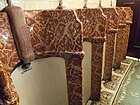Philharmonic Dining Rooms, Liverpool
History
The public house was built in about 1898–1900 for the brewer Robert Cain. It was designed by Walter W. Thomas (not to be confused with Walter Aubrey Thomas the designer of the Royal Liver Building) and craftsmen from the School of Architecture and Applied Arts at University College (now the University of Liverpool), supervised by G. Hall Neale and Arthur Stratton.
Paul McCartney performed at the Philharmonic when he was a young musician, and during an impromptu concert in 2018.
Architecture
Exterior
The building is constructed in ashlar stone with a slate roof in an "exuberant free style" of architecture. It has a combination of two and three storeys, with attics and cellar. There are ten bays along Hope Street and three along Hardman Street. Its external features include a variety of windows, most with mullions, and some with elaborate architraves, a two-storey oriel window at the junction of the streets, stepped gables, turrets with ogee domes, a balustraded parapet above the second storey, a serpentine balcony (also balustraded) above the main entrance in Hope Street, and a low relief sculpture of musicians and musical instruments. The main entrance contains metal gates in Art Nouveau style, their design being attributed to H. Bloomfield Bare.
Interior
There are 5 floors in total, with the main bar interior decorated in musical themes that relate to the nearby concert hall. These decorations are executed on repoussé copper panels designed by Henry Bloomfield Bare and by Thomas Huson, plasterwork by C. J. Allen, mosaics, and items in mahogany and glass. Two of the smaller rooms are entitled Brahms and Liszt. Of particular interest to visitors is the high quality of the gentlemen's urinals, with pink-marble basins and pink imitation-marble urinal surrounds.
-
Art Nouveau gates in main entrance
-
Rose-coloured imitation-marble urinals in the Philharmonic Dining Rooms
-
Interior view of the Philharmonic Dining Rooms
Appraisal
Pollard and Pevsner, in the Buildings of England series, state that it is the most richly decorated of Liverpool's Victorian public houses, and that "it is of exceptional quality in national terms". The Grade I listing means that it is "of exceptional interest". Pye describes it as one of Liverpool's "architectural gems".
See also
References
- ^ Pye, Ken (2011), Discover Liverpool, Liverpool: Trinity Mirror Media, p. 38, ISBN 978-1-906802-90-5
- ^ Historic England. "Philharmonic Hotel (1207638)". National Heritage List for England. Retrieved 31 January 2020.
- ^ David Beckingham (2017). The Licensed City: Regulating Drink in Liverpool, 1830-1920. Oxford University Press. pp. 208–. ISBN 978-1-78138-343-8.
- ^ Sharples, Joseph; Pollard, Richard (2004), Liverpool, Pevsner Architectural Guides, New Haven and London: Yale University Press, pp. 234–235, ISBN 0-300-10258-5
- ^ Topping, Alexandra (22 June 2018). "Paul McCartney serves up surprise show in Liverpool pub". The Guardian.
- ^ "Beatle's pub show please pleases fans". BBC News. 11 June 2018.
- ^ Matthew H. Clough (2003). C.J. Allen 1862-1956: Sculptor and Teacher. Liverpool University Press. pp. 32–. ISBN 978-0-85323-609-2.
- ^ "The Philharmonic Dining Rooms, 36 Hope Street, Liverpool, L1 9BX", Historic England, accessed 2024-03-19
- ^ Listed Buildings. Historic England. Retrieved 31 January 2020.
External links
![]() Media related to The Philharmonic Dining Rooms at Wikimedia Commons
Media related to The Philharmonic Dining Rooms at Wikimedia Commons


